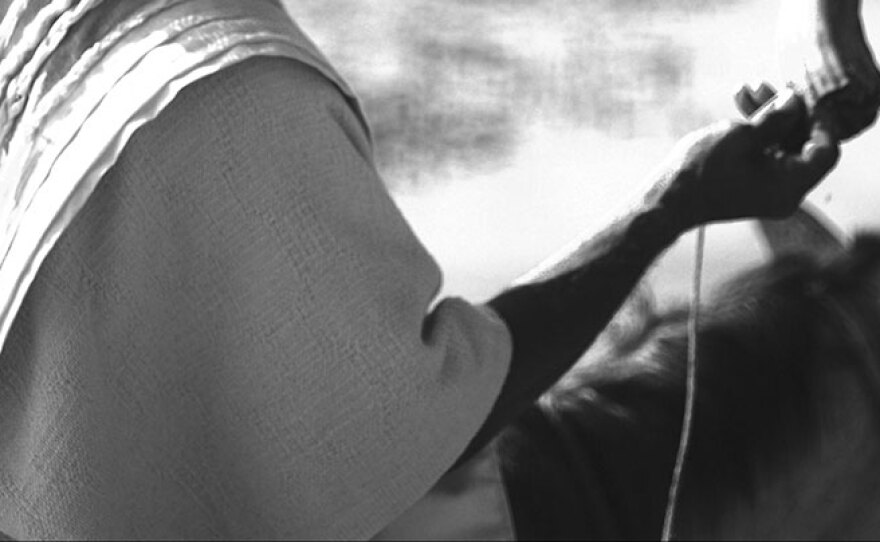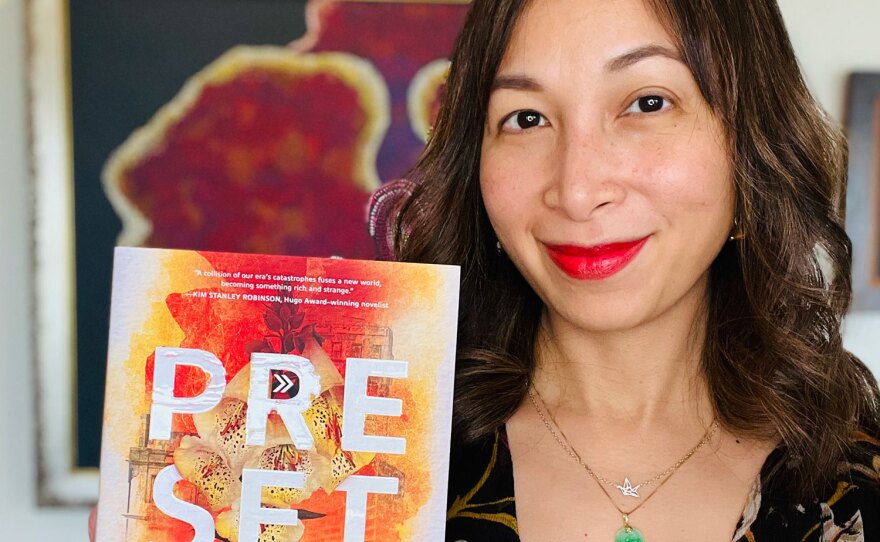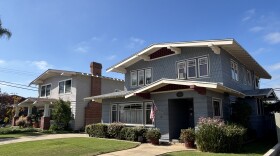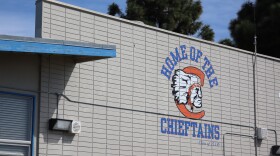Ten children buzzed into the front office of the Rancho Mission Trails apartment to rehearse their play for this year’s Kuumba Fest, San Diego’s annual celebration of Black American culture.
Seventh grader Dwayne Rew, who plays the role of the big brother panther, explained the plot.
“We have to go get the Golden Rule to open back up our 7-Eleven so we could get our food because somebody has stolen our gratitude,” he said.
The play is a modern folktale about returning to community values and leaning on elders’ wisdom, like treating others how you want to be treated.
But Dwayne said along the way, he learned parts of African American history he hasn’t yet learned in school, like how traders would break the wills of enslaved people so they didn’t rebel.
“I feel like my teachers — my history teachers — they wouldn't really tell me that,” he said. “They probably think, ‘Oh, he's not going to do anything with that information.’“
Second grader Langston Coleman plays Dwayne’s little brother panther. He’s nervous and excited, he said.
The play gets into some pretty high-level themes, but Langston didn’t let hard words stop him as the group ran through the script.
“Low ... level ... consciousness?” he sounded out, and the older children affirmed him.
Eleventh grader Dorcas Nduma, who plays the mother panther, has participated in Kuumba Fest since fifth grade. She said it offered her belonging after she immigrated from East Africa.
“It’s like 'Oh my gosh, you're my people!'” she recalled. “'I want to be surrounded by you,' and stuff like that. And so at first it was hard for me because I didn't see that space, but then once I was like, 'Oh my gosh, you guys are actually here!'”
The performances even include lines in Swahili, which Dorcas speaks.
Kuumba Fest’s motto is "kujichagulia," which means "self-determination."
For years, Kuumba Fest was held downtown. This year, it’s moving to the newly formed Black Arts and Culture District, which stretches from 61st to 69th Street on Imperial Avenue. The district includes landmarks like the trolley tracks, Imperial Barbershop, the murals of Graffiti Gardens and the Boys and Girls Club.

Holding the festival in the district is the culmination of more than 30 years of advocacy.
It offers the community an antidote to negative portrayals of Black Americans, said Kuumba Fest founder Dajahn Blevins.
“When young people leave (the festival),” he said, “They’re not saying, ‘Oh, I’m going to be Superman. I’m going to be Batman.’ When they’re playing, they incorporate Imhotep, Shaka Zulu, Nzinga.”
Blevins said the district combats the myth of “Southeast San Diego,” which was created through redlining and systemic racism.
Discriminatory housing practices relegated non-white people primarily to segregated neighborhoods in the southeast area of the city. Those neighborhoods were then consistently underserved and neglected, resulting in higher environmental pollution, worse health outcomes and less wealth. Though they were distinct neighborhoods, ignorance and stigma threw them under one label: Southeast.
“Instead of saying Encanto, Emerald Hills, Webster, Valencia Park, Skyline, we were relegated to just being Southeast,” Blevins said. “And the more we were relegated to that, the more the politicians began to believe in that, the more the media — I don't care what community it would happen in, the media would say, ‘In Southeast San Diego, there was a drive by.’”

Blevins has helped lead a charge to end that. They held a funeral service with a casket for “Southeast.” They buried that negativity. Now, they’re rebranding.
Blevins noted places to celebrate other cultures in historic neighborhoods across San Diego, like Little Italy and Chicano Park. He questioned why the area where Black people lived was just called “the hood.” Where was their celebration?
He said they’d been pushing for a Black Arts and Culture District since the ‘90s, but the city never approved it until after the movements that followed George Floyd’s murder.
Relocating Kuumba Fest to the district is one piece of his vision to change the way the city sees this neighborhood, and the way the community members see themselves.
“This is something I know,” he said. “One of the strongest draws that we've had and have is our art, our culture, our music, our dance, our expression. And when we do events that showcases that, everybody comes.”
He hopes the area can become like Leimert Park in Los Angeles, a center of Black culture, music and art.
And after more than three decades, he’s ready to pass down the effort to the next generation — including Brandon Baker.

Baker was recently hired as the manager of Encanto’s Boys and Girls Club, and grew up in Leimert. He witnessed what could be and carried that vision to Imperial Avenue.
He wants the rest of the city to give the new district and the surrounding neighborhoods a chance — frequent the businesses, try the food, come to the events.
It’s human nature, he figures. If something doesn’t look appealing at first glance you walk away. But that cuts short the possibility for growth.
“We didn’t make it this way,” he said, referring to the lack of resources and underdevelopment of the area. “This is systemic.”
He invites people to change their perspective.
The entire community is welcome to the Black Arts and Culture District this weekend to witness concerts, dancing, theater, and the embodiment of decades of kujichagulia.
-
There are three very different ways you can experience music in San Diego this weekend, from a new jukebox musical and a music fest in North Park.
-
Local author Sarina Dahlan's "Preset" imagines a world where what's left of human civilization is highly controlled in order to avoid extinction.









